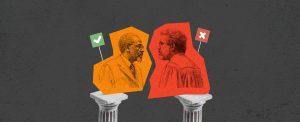The U.S. Supreme Court is considering an appeal against a federal regulation requiring the owners of fishing vessels in the Atlantic to pay the cost of being monitored while at sea (see Ascend Magazine’s Week in Brief published on January 19, 2024. If they decide in favour of the claimants, the owners of fishing fleets, it will overturn a longstanding precedent that the higher court should give deference to properly made, reasonable decisions by a lower court or tribunal.
The Chevron Deference (named after a claim by Chevron oil against the Natural Resources Defence Council in 1984) requires the court to defer to a regulator’s interpretation of laws passed by the federal government unless the interpretation is, “arbitrary, capricious, or manifestly contrary to the statute”. Reasonableness is of course a common term in law and previously the U.S. courts have decided that it was reasonable in this case for the cost of regulation to be imposed on the regulated. Over the years this doctrine has been disputed, not least by some current members of the Supreme Court, on the grounds that it allows for differences in interpretation by states and is an abdication of judicial responsibility.
A decision by the Supreme Court that the fishing regulator’s decision is not reasonable and that it does not need to give deference to the decision of the lower court is likely to have consequences for other regulators in the U.S. and to encourage challenges to their powers.
Deference to a lower court or to an expert tribunal is a long-established restraint on the possibility of endless appeals against decisions someone doesn’t like. Deference assumes that the court or tribunal was properly constituted, followed due process and had the expertise to make an appropriate decision.
The concept of deference still holds in Ontario, Canada. In a recent judicial review brought against the College of Psychologists by a claimant who argued that the College was infringing his right to free speech, the court determined that while health professionals retain their free speech rights, they are also bound by regulatory ethics which might occasionally limit their freedom of expression. Importantly, the judge held that the regulator’s investigations committee was competent to make the decision it did and that he would not overrule it. The Ontario Court of Appeal upheld this decision.
The concept of deference to the lower court or tribunal has long been a principle in the relationship between a regulator’s disciplinary tribunal and the right of appeal.
Appeal against a regulatory tribunal will often fail on the presumption that the expert tribunal knows what it is doing and as long as procedure has been correctly followed, relevant evidence taken into account and sound reasons given the higher court will defer to its competence and not intervene.
A high-profile case in the UK concerns the death in hospital of a small boy under the care of a young doctor. It was established that multiple failures by a young doctor caused his death and, unusually, the doctor was charged and convicted of gross negligence manslaughter and given a six-month suspended sentence. When the case came before the Medical Practitioners Tribunal, they imposed a 12-month suspension saying that erasure from the register would be disproportionate.
The medical regulator appealed against this decision to the High Court which overturned the decision of the tribunal, and the doctor was struck off. The regulator had argued that it should follow the opinion of the original trial judge which was that the doctor should never work again.
The doctor, supported by funds donated by thousands of other doctors, appealed to the Court of Appeal which overturned the decision of the High Court and reinstated the original 12-month suspension. In doing so it restated the principle of deference stating that, “The Medical Practitioners Tribunal was an expert body entitled to reach its conclusions, including the important factor weighing in favour of [the doctor] that they are a competent and useful doctor who represents no material continuing danger to the public and con provide considerable useful service to society.”
This finding also makes clear that, while the trial judge found the doctor guilty of the offence at the time, the tribunal had a different decision to make: was the doctor competent to practice now? The Court of Appeal made clear that the tribunal was entitled to make that decision.
There is no doubt that there is a debate at the moment about whether or not regulators are over-reaching their powers. These are just few examples of the shifting relationship between regulators and the courts. Regulators need to watch out for significant challenges to the scope of regulation in the future.
Harry Cayton is a sought-after global authority on regulatory practices who created the Professional Standards Authority (PSA) and pioneered right-touch regulation. He is a regular Ascend Voices contributor.
MORE VOICES ARTICLES

Trust on trial: Navigating the murky waters of scientific integrity
As fraudulent research papers flood academic journals, the sanctity of scientific discovery is under siege, challenging the very foundation of trust we place in peer-reviewed publications. With AI now both a tool for creating and detecting such deceptions, the urgency for a robust, independent regulatory framework in scientific publishing has never been greater.

Do regulators deserve deference?
In a pivotal moment for regulatory law, the U.S. Supreme Court’s review of the Chevron doctrine could redefine the bounds of deference courts give to regulatory agencies, potentially inviting more challenges to their authority. This critical examination strikes at the heart of longstanding legal principles, signaling a significant shift in the landscape of regulatory oversight and its interpretation by the judiciary.

From Frankenstein to Siri: Accountability in the era of automation
As AI advances in sectors from health care to engineering, who will be held accountable if it causes harm? And as human decision-makers are replaced by algorithms in more situations, what will happen to uniquely human variables like empathy and compassion? Harry Cayton explores these questions in his latest article.

Regulating joy: The risky business of festivities
In his final Voices article of 2023, Harry Cayton reflects on our enthusiasm for participating in cultural festivities that often cause injuries or even deaths, which has led some governments to attempt to regulate these risky celebrations.

Building my regulator of tomorrow with LEGO® bricks
What should the regulator of tomorrow look like? While there may be no definitive vision, contributor Rick Borges gets creative with answering this important question, drawing inspiration from a favorite toy to ‘build’ a model of an effective future regulator.

‘Thin’ and ‘thick’ rules of regulation: Cayton reviews Daston’s history of what we live by
Lorraine Daston explores fascinating examples of rulemaking throughout history in her new book, ‘Rules: A Short History of What We Live By.’ In this article, Harry Cayton discusses what regulators can learn from Daston’s work.








